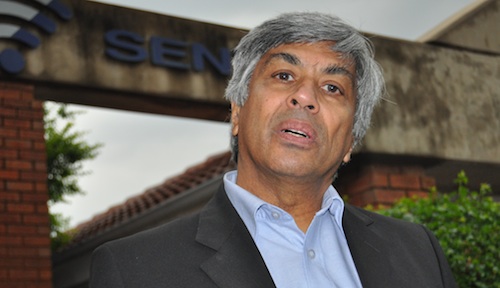
State-owned broadcast signal distributor Sentech is getting ready for another go at building a national wireless broadband network, TechCentral has learnt exclusively.
This time, though, it’s promising not to repeat the mistakes that cost it more than R500m when its much-trumpeted MyWireless project failed.
Sentech chairman Quraysh Patel says the company is drawing up a business plan that will probably result in it spending about R2bn rolling out a national network based on WiMax technology.
The network will be built in such a way that Sentech can migrate to long-term evolution (LTE), a newer wireless broadband technology favoured by the country’s mobile operators, over time.
The news is likely to surprise many in the telecommunications sector, where industry executives have repeatedly called for Sentech to hand back its valuable radio frequency spectrum allocations in the 2,6GHz and 3,5GHz bands.
But Patel insists Sentech must be given the opportunity to use the available frequency before government or industry regulator, the Independent Communications Authority of SA, consider taking it back. If it doesn’t use it efficiently, it will gladly hand it back.
And, he promises, the company has learnt from its costly mistakes. This time, Sentech has no intention of serving retail customers directly. Patel says the company was ill prepared to provide services to end users, contributing to the demise of MyWireless. He also concedes it chose the wrong technology.
MyWireless was a “complete disaster”, Patel says. “We spread 80 base stations across the country with no proper business plan. We hired in skills without thinking about the consequences and didn’t ask: what if this business fails?”
But, he says, because Sentech is “so good at providing [broadcasting] signals — you’ve never not had a signal from us — why shouldn’t we also provide broadband signals?”
There are no plans to build a mobile network. Rather, Sentech wants to provide fixed-wireless services, particularly in rural and underserviced areas. “All I want to do is reduce the cost of communication,” Patel says.
The idea behind the new broadband business plan, which is at an advanced stage of being drafted, is to work through partners, particularly provincial governments and metropolitan and town councils, to provide broadband services directly to consumers.
Patel says Sentech is in discussions with the Gauteng provincial government and with Broadband Infraco, another state-owned company, about partnering to provide services. It wants Infraco to provide it with national fibre backhaul.
“We want to sell broadband to the provinces on the guarantee they meet certain price levels [to consumers] so there will always be affordable broadband available. Libraries and clinics should get it for free and schools at a [big discount].”
Sentech is also in discussions about becoming an investor in the East African Submarine System (Eassy), the cable system along Africa’s east coast. It’s in talks to buy a stake in Eassy shareholder, the West Indian Ocean Cable Company.
Patel says the idea is not to maximise financial returns for Sentech’s shareholder, government, but rather to provide what he calls a “social dividend”.
“Private networks are not as interested in bridging the digital divide as much as making a profit. Our shareholder needs to provide a social dividend to the country,” he says.
But he promises the company isn’t going to ask government for more than the R500m (now about R580m with interest accrued) it has already been given by national treasury to build a network. Much of the remaining R1,4bn or so will come from the provinces, he says.
Though the principal focus is rural areas, Patel says that if the project goes ahead, Sentech will also build base stations in urban areas, including upmarket suburbs like Sandton, which are already well served by other operators.
In urban areas Sentech will use the 3,5GHz band to provide broadband, especially to businesses and government. In more outlying areas it will use its generous 50MHz allocation in the 2,6GHz band to provide services.
“I will put up a base station in Sandton because I want to cross-subsidise [the rural areas],” he says. But this won’t mean it taking on the mobile operators at their own game, he promises.
“We should not be competing with those guys,” he says. “We’re not going into retail; we’re a wholesaler.” — Duncan McLeod, TechCentral
See also: The shame that is Sentech
- Subscribe to our free daily newsletter
- Follow us on Twitter or on Facebook




